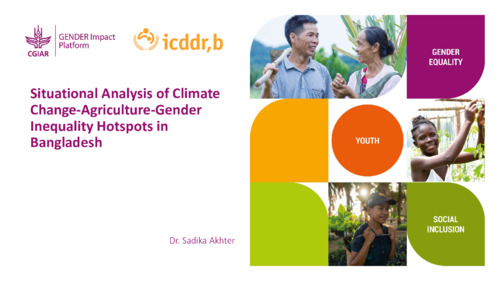Situational Analysis of Climate Change-Agriculture-Gender Inequality Hotspots in Bangladesh
Abstract
Study objective: Bangladesh is a climate-vulnerable country with gender inequality and inequity that reinforce gender-based constraints for women in agriculture. Climate change has been a critical challenge to achieving equality and transformative change in the agri-food systems of the country. A situational analysis was conducted in two gender inequality hotspots in the Dhaka and Barisal divisions. The objective of the situational analysis is to assess the challenges and opportunities for transformative change in agrifood systems under climate change. Methodology: A mixed-methods approach was employed, including a household survey with 1,230 participants from 615 households, in-depth interviews with 60 couples, four focus group discussions, and 25 key informant interviews. Data collection took place between June and August 2022. Results: The study reveals that natural disasters and climate change significantly impact crop production, livestock and fisheries in gender inequality hotspots in Bangladesh. Women primarily engage in homestead gardening and livestock rearing, while men have better access to agricultural resources and market opportunities. Despite women’s involvement, gender disparities persist in losses, damages and family food consumption. Climate change further exacerbates these challenges by restricting women’s market access compared to men’s. Implications: Climate change impacts agriculture and reinforces gender inequalities in Bangladesh. The study emphasizes the importance of addressing gender disparities in accessing resources, market opportunities and decision-making power to achieve transformative change in agri-food systems to promote gender equality, empower women in agriculture and build resilience to climate change.

